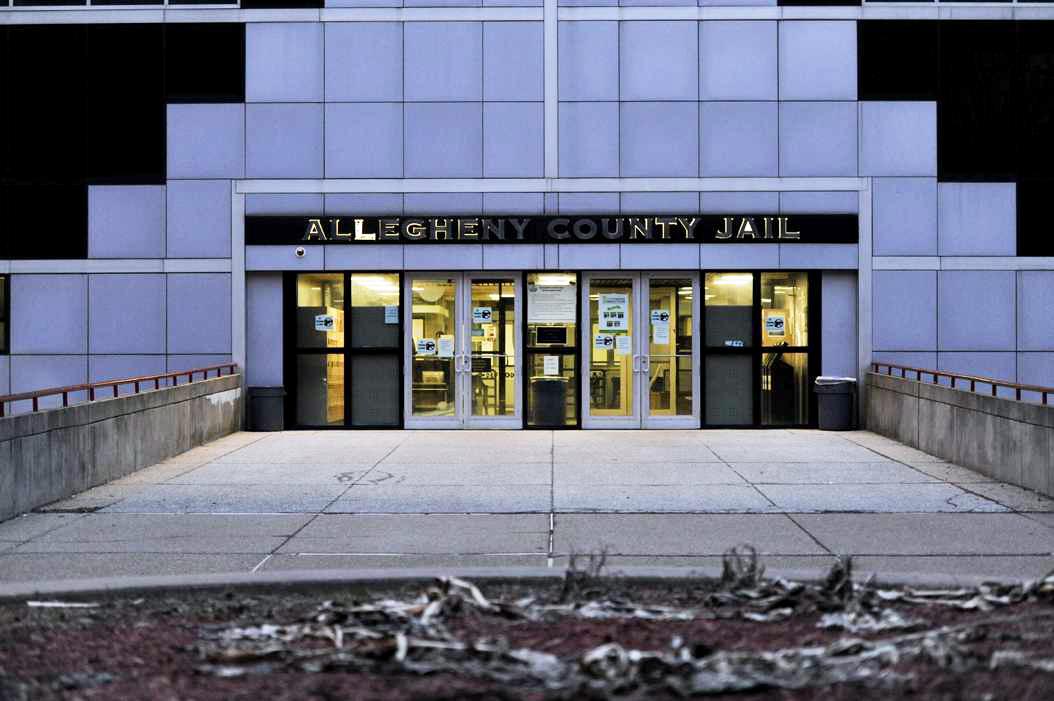Opinion | Our community deserves better than the Allegheny County Jail


The front entrance of Allegheny County Jail in Downtown.
While riding Interstate 376 into Pittsburgh, you’ll pass a towering building — the Allegheny County Jail. The jail routinely makes local headlines for issues such as solitary confinement and the spread of COVID-19, as well as unsanitary and unsafe conditions.
ACJ has an annual budget of about $80 million and, on average, holds about 1,800 individuals each day. Most individuals at ACJ are constitutionally presumed innocent and have not yet been convicted. The Jail Oversight Board supervises the discipline and safety of individuals at ACJ, and the management of the facility. It is composed of nine members, including Allegheny County Executive Rich Fitzgerald.
Fitzgerald has rarely ever been present at meetings over his 10 years of service and instead sends a designee. In recent years, the designee has been Barb Parees, the former deputy county manager, who continued to attend board meetings even after retiring.
When asked about Fitzgerald’s chronic absences, County spokesperson Amie Downs said Fitzgerald “by statute, serves on several dozen boards and is not able to attend each and every one in person.”
“He relies upon staff members to attend and participate in his stead on these many boards,” Downs said. “They, in turn, keep him apprised of any developments or issues.”
An open letter was published in April 2021 that demanded Fitzgerald begin attending meetings. It had two dozen prominent signers, including 1Hood Power, Alliance For Police Accountability and Casa San Jose. Fitzgerald came to one meeting in July 2021, and then began sending a designee again. When the county executive won’t even prioritize showing up, it can be assumed that conditions at the jail are not a priority, either.
The jail’s conditions seem abysmal. Since the pandemic began in 2020, the jail has been operating under a “23-and-1” lockdown, meaning that most individuals have only been getting one hour out of their cells each day. Allegheny County residents voted for a referendum last spring, which took effect in December 2021, that requires at least four hours of recreational time everyday and bans solitary confinement.
When the jail began to comply with the referendum, reports came out about individuals handcuffed to tables during recreation time. ACJ has since returned to a lockdown due to dozens of corrections officers testing positive for COVID-19. There have also been at least 300 instances of segregating individuals despite the solitary confinement ban going into effect.
This relates to another huge issue — mental health. Last spring’s referendum also required ending the use of restraint chairs to immobilize individuals. In recent years, ACJ has used the restraint chair more than any other county jail in Pennsylvania and there have been concerns about misuse.
Former medical and mental health employees of ACJ have spoken out about the facility’s harmful practices. Due to understaffing, medications are often given late or missed entirely, and seeing a psychiatrist can take weeks to months. Conditions are so bad that one employee quit after only three weeks and when asked to describe the jail’s mental health care he said, “nonexistent.” That doesn’t sound like an environment that promotes rehabilitation.
Multiple lawsuits have been filed in recent years by organizations such as Abolitionist Law Center and ACLU PA, that assert failing mental health care and COVID-19 mitigation. Howard v. Williams alleged brutal treatment of individuals with psychiatric disabilities and a lack of functional mental health care. Graham v. Allegheny County focused on individuals’ inability to practice social distancing in the facility when many have pre-existing conditions, and the warden’s decision to keep an entire floor unoccupied. In the lawsuit, the plaintiffs argue that their health conditions, including hepatitis C, hypertension, and asthma, increase the likelihood that they will suffer serious or permanent harm from COVID-19.
At best, the leadership is apathetic and at worst they are cruel. ACJ attempted to ban the purchase of books for individuals incarcerated at the facility in 2020. After public outcry and a letter from ACLU PA, Abolitionist Law Center and Pa. Institutional Law Project, the policy was rescinded. This showed that holding the jail accountable could make a difference.
One of the biggest problems appears to be transparency. Claims from individuals about abusive staff, such as mistreatment of transgender individuals, and other issues with living conditions, such as heat, are usually flatly denied by county jail representatives. When PublicSource asked for public records about ACJ’s mental health policies, an abnormal amount of the records were redacted, and ACJ provided much less information than other facilities.
I spoke with Bethany Hallam, an at-large member of the Allegheny County Council and member of the Jail Oversight Board. She is the only formerly incarcerated individual to sit on the board, and spent time herself in ACJ. She’s been an outspoken advocate for those currently incarcerated at the jail.
“Most of the information that I get in my capacity as a member of the Jail Oversight Board is from people who are incarcerated there, the loved ones of the people who are incarcerated there and also sometimes even staff members,” Hallam said last Thursday. “Without those statements, we wouldn’t have a clear picture of what is going on inside the jail, which is why the jail has consistently pushed back against allowing incarcerated individuals to participate in the Jail Oversight Board meetings.”
The demographics in ACJ point to other systemic problems in Allegheny County — what critics see as racism and policing. Black individuals make up 13.4% of Allegheny County’s population, but 67% of the County Jail population. In the Pittsburgh Bureau of Police’s 2020 published statistics, they reported frisk searching 901 individuals, 692 of whom were Black.
The City police’s 2022 operating budget is about $120 million — a budget allocation that has increased by about 50% since 2015. Recently, the ACLU reported that Allegheny County students are arrested more often than anywhere else in Pennsylvania, especially at Pittsburgh Public Schools. Black students at PPS are arrested at more than four times the rate of white students.
The problems at ACJ mimic our nation’s problems. The most common offense individuals are facing at ACJ is drug possession, and nearly half a million people are incarcerated across the country for the same reason. Issues with policing, cash bail and the attempted destruction of community bail funds, adultification bias and the incarceration of Black women are pertinent in our county and counties everywhere.
That’s why it’s so necessary to be fighting for the things we can change in our own community. Supporting organizations like Alliance for Police Accountability, 1Hood, Abolitionist Law Center and ACLU PA with your time and money, watching the Jail Oversight Board meetings and talking about this with your peers are all great first steps. Improving the quality of life at ACJ needs to be a priority of this county. Fitzgerald needs to be at every oversight board meeting. An independent investigation into the conditions at the jail needs to be done.
But the truth is, even if the conditions at ACJ were acceptable, that still wouldn’t fix the problem. The problem is the classist and racist legal system that allows individuals to be arrested, put in a facility and forced to make bond before they’ve even been convicted — nevermind the systemic discrimination equally present in the courts. What could the future of our City look like if we took ACJ’s budget and invested it back into our community?
“No one needs to be in the jail,” Hallam, an advocate for community-centered restorative justice, said. “Especially the 95% of the current population who could be released tomorrow if we had a humane criminal legal system. Stop detaining people pre-trial, stop detaining folks for technical probation violations and right there you’ve eliminated 1,500 people from the jail.”
It is vitally important to join organizers and abolitionists across Allegheny County in the fight for our neighbors, family members and friends, for structural change and for a future without jails like ACJ.
India is The Pitt News’ informed rebel girl. Write to her at ilk18@pitt.edu or follow her on Twitter @indialarson_, but you better like her tweets.
Recent Posts
SGB introduces new governing code bill and addresses rumors of ICE on campus
At its weekly meeting at Nordy’s Place on Tuesday, Student Government Board introduced an omnibus…
Opinion | School should be in the summer
Although this may be controversial, I believe that from this data, it is evident that…
Weathering the storm: Pittsburgh teams have tackled some of the toughest environments
The end of the year in western Pennsylvania is always marked by two things —…
Notes From an Average Girl // Notes on Book Banning
In this edition of Notes From an Average Girl, senior staff writer Madeline Milchman writes…
To Be Honest // Yup, it is that damn phone
In this edition of To Be Honest, staff writer Evin Verbrugge writes about her phone…
Meaning at the Movies | Portraying Toxic ‘Adolescence’
In this edition of Meaning at the Movies, staff writer Lauren Deaton explores the mini-series…

